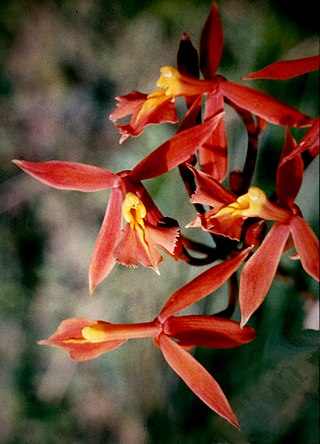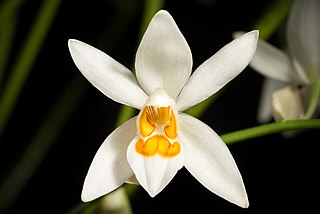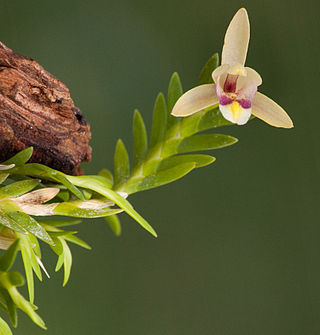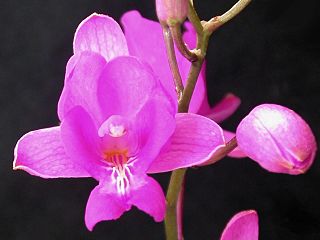
Orchids are plants that belong to the family Orchidaceae, a diverse and widespread group of flowering plants with blooms that are often colourful and fragrant. Orchids are cosmopolitan plants that are found in almost every habitat on Earth except glaciers. The world's richest diversity of orchid genera and species is found in the tropics.

Cypripedioideae is a subfamily of orchids commonly known as lady's slipper orchids, lady slipper orchids or slipper orchids. Cypripedioideae includes the genera Cypripedium, Mexipedium, Paphiopedilum, Phragmipedium and Selenipedium. They are characterised by the slipper-shaped pouches of the flowers – the pouch traps insects so they are forced to climb up past the staminode, behind which they collect or deposit pollinia, thus fertilizing the flower. There are approximately 165 species in the subfamily.

The taxonomy of the Orchidaceae (orchid family) has evolved slowly during the last 250 years, starting with Carl Linnaeus who in 1753 recognized eight genera. De Jussieu recognized the Orchidaceae as a separate family in his Genera Plantarum in 1789. Olof Swartz recognized 25 genera in 1800. Louis Claude Richard provided us in 1817 with the descriptive terminology of the orchids. (See External links below). The next step was taken in 1830-1840 by John Lindley, who recognized four subfamilies. He is generally recognized as the father of orchid taxonomy. The next important step was taken by George Bentham with a new classification, recognizing subtribes for the first time. This classification was first presented in a paper that Bentham read to the Royal Society in 1881. Then it was published in 1883 in the final volume of Genera Plantarum. The next great contributors were Pfitzer (1887), Schlechter (1926), Mansfeld (1937), Dressler and Dodson (1960), Garay (1960, 1972), Vermeulen (1966), again Dressler (1981). and Burns-Balogh and Funk (1986). Dressler's 1993 book had considerable influence on later work.

The Orchidoideae, or the orchidoid orchids, are a subfamily of the orchid family (Orchidaceae) that contains around 3630 species. Species typically have a single (monandrous), fertile anther which is erect and basitonic.

The Oncidiinae is a subtribe within the Orchidaceae that consists of a number of genera that are closely related.

Epidendroideae is a subfamily of plants in the orchid family, Orchidaceae. Epidendroideae is larger than all the other orchid subfamilies together, comprising more than 15,000 species in 576 genera. Most epidendroid orchids are tropical epiphytes, typically with pseudobulbs. There are, however, some terrestrials such as Epipactis and even a few myco-heterotrophs, which are parasitic upon mycorrhizal fungi.

Arethuseae is a mid-sized tribe of orchids in the subfamily Epidendroideae. This tribe was initially categorized by John Lindley in 1840. Its largest subtribes are Arethusinae and Coelogyninae.

Odontochilus is a small genus from the orchid family (Orchidaceae). These terrestrial, mycoparasitic orchids occur from China, Japan, the Himalayas, Southeast Asia, New Guinea and Melanesia. The genus is related to Gonatostylis, endemic to New Caledonia.
Manniella is a genus of orchids belonging to the subfamily Orchidoideae.

The Vandeae is a large monophyletic tribe within the family of orchids.

Beloglottis is a genus of the family Orchidaceae. This genus belongs to the tribe Cranichideae and subtribe Spiranthinae. Orchids of the genus Beloglottis are terrestrial sympodial plants that can be used as herbal supplements. They have short, solitary stems that stand erect and the fleshy roots contain small hair-like projections and are arranged in a fascicle. Several leaves containing a petiole form at the base of the plant. The flowers appear as if they are upside down.
An alliance is an informal grouping used in biological taxonomy. The term "alliance" is not a taxonomic rank defined in any of the nomenclature codes. It is used for any group of species, genera or tribes to which authors wish to refer, that have at some time provisionally been considered to be closely related.

The tribe Epidendreae of the Orchidaceae comprises six subtribes:

Discyphus is a genus of flowering plants from the orchid family, Orchidaceae. It is the only genus in the subtribe Discyphinae of the tribe Cranichideae. It contains only one currently recognized species, Discyphus scopulariae, with two accepted varieties:
Pachyplectron is a genus of flowering plants from the orchid family, Orchidaceae. The genus contains three species, all endemic to New Caledonia. The genus is related to Odontochilus.

Dendrobieae is a tribe in the subfamily Epidendroideae, in the family Orchidaceae. The Dendrobieae are mostly tropical, epiphytic orchids which contain pseudobulbs.

Cranichidinae is an orchid subtribe in the tribe Cranichideae.

Goodyerinae is an orchid subtribe in the tribe Cranichideae.

Spiranthinae is an orchid subtribe in the tribe Cranichideae.
Galeoglossum is a genus of orchids native to Mexico and Guatemala.
















